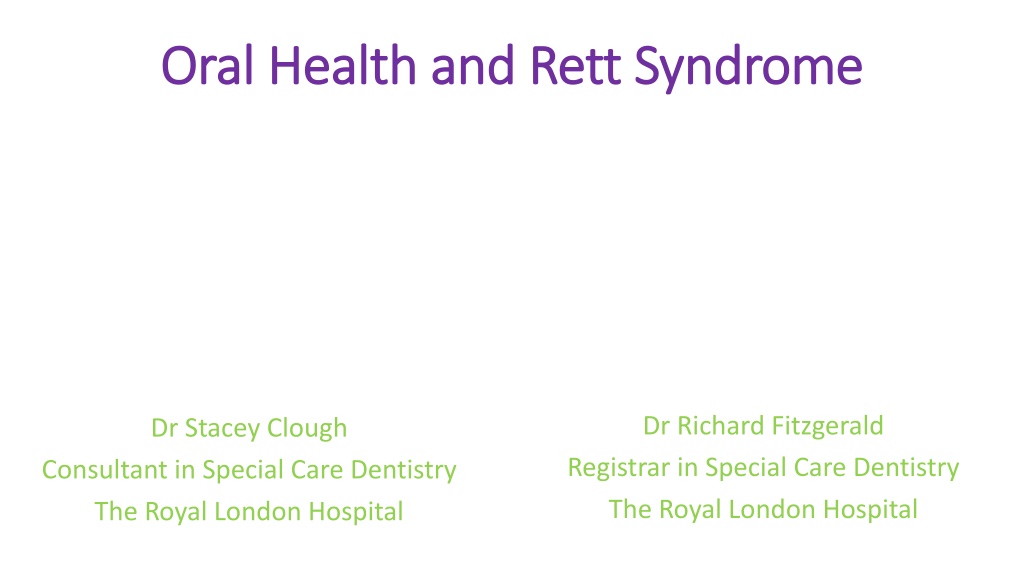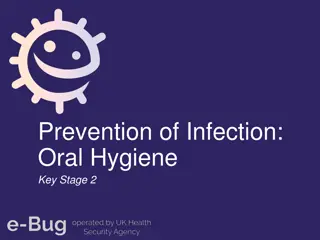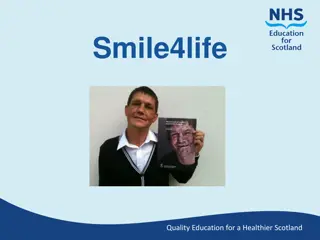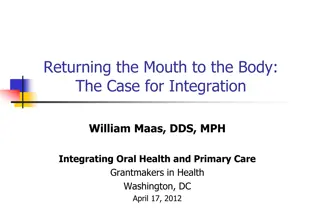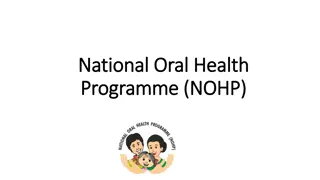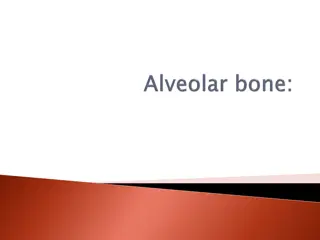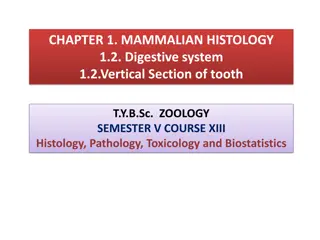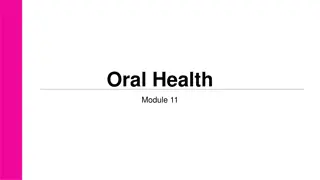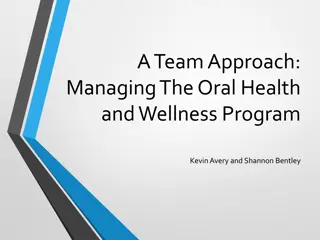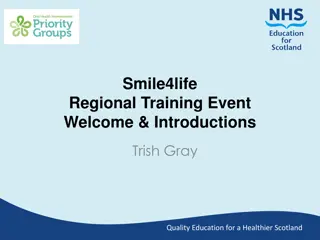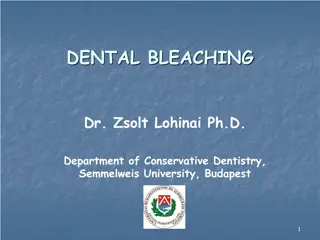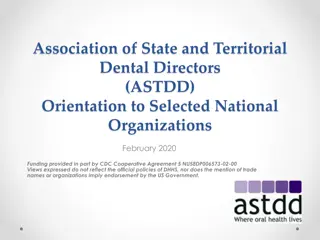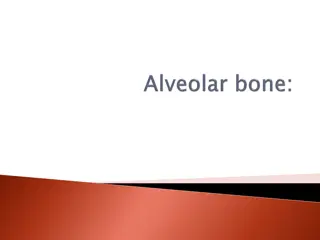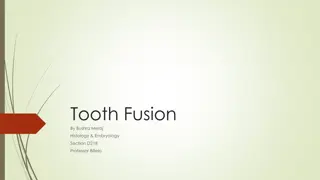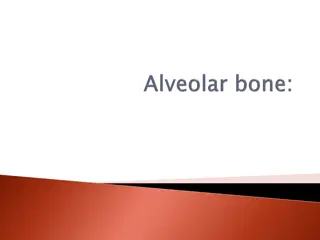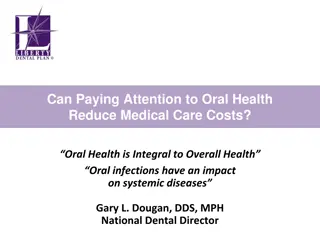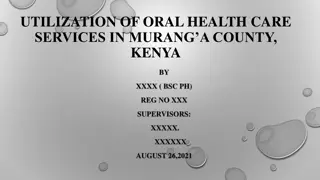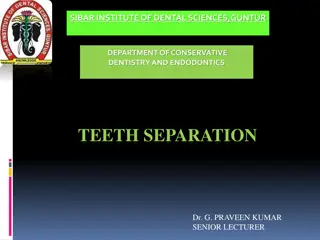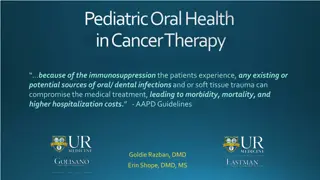Understanding Oral Health and Tooth Care for Children
Explore the importance of oral health in children, covering topics such as healthy teeth and gums, baby teeth and adult teeth development, new teeth eruption, tooth decay prevention, and the benefits of sugar-free foods. Learn how to maintain proper oral hygiene to ensure a lifetime of healthy smiles.
Download Presentation

Please find below an Image/Link to download the presentation.
The content on the website is provided AS IS for your information and personal use only. It may not be sold, licensed, or shared on other websites without obtaining consent from the author. Download presentation by click this link. If you encounter any issues during the download, it is possible that the publisher has removed the file from their server.
E N D
Presentation Transcript
Oral Health and Oral Health and Rett Rett Syndrome Syndrome Dr Richard Fitzgerald Registrar in Special Care Dentistry The Royal London Hospital Dr Stacey Clough Consultant in Special Care Dentistry The Royal London Hospital
What will we learn about today? What will we learn about today? Drooling Oral Pain Healthy teeth Tooth paste Dental Accidents Grinding
Healthy Teeth Healthy Teeth Healthy Gums Healthy Gums Teeth are used for eating, speaking, and smiling. Healthy gums are pink and do not bleed when brushed. They are not swollen or sore. Teeth have a crown that you can see and roots to hold the tooth in your jaw bones. Gums can stay healthy from twice a day toothbrushing. Teeth are made of a hard outer layer called enamel and an inside layer called dentine with the nerves and arteries/veins in the middle bit which is also called the pulp
Baby Teeth and Adult Teeth Baby Teeth and Adult Teeth Baby teeth: between 6 months and 3 years Adult teeth: between 6 years and 13 years Wisdom teeth: 18 years onwards These times can vary quite a bit
New Teeth New Teeth When the adult teeth are coming in, you might have both your adult teeth and baby teeth. Usually your baby teeth will fall out when your adult teeth grow in (but not always!). Sometimes new teeth may be uncomfortable, and sometimes there might be a small purple swelling on the gums when the tooth grows in. This is normal and will go away by itself.
Tooth Decay Tooth Decay If you eat or drink a lot of sugar, and do not brush your teeth, you might get tooth decay. Tooth decay causes holes to form in your teeth and causes them to turn black, brown, or grey. If the hole gets big it might reach the nerve of the tooth (remember the pulp?) and cause tooth ache and infection. These infections can be big and can cause swellings of your face.
Sugar Free Sugar Free No Added Sugar No Added Sugar Sugar-free foods and drinks are good for your teeth because they do not cause tooth decay. But be careful! Some foods and drinks say no added sugar but they can still contain natural sugars. These drinks may include juice drinks and diluted squashes.
Medications Medications Medicines are really important for your health. However, some medicines may also cause your mouth to be dry. Saliva helps protect your teeth so if you have a dry mouth, you need to be extra careful about avoiding sugars and brushing your teeth with a fluoride toothpaste. You should not stop taking your medicines if you notice a dry mouth without talking to a doctor first.
Ulcers Ulcers Sometimes you can get ulcers on your cheeks or lips. These can be painful. Most of the time, they will go away by themselves within 3 weeks. If an ulcer lasts longer than 3 weeks you should show it to your dentist.
Saliva Saliva Saliva is really important for keeping your teeth and your mouth healthy. However, sometimes you can have a dry mouth (remember medicines?) and sometimes you can have too much saliva. Sometimes if it is difficult to close the mouth or swallow, you might have drooling.
Gum Disease Gum Disease Healthy Gums Healthy Gums If you have plaque on your teeth and do not brush it off, your gums might become red and swollen. They might also become sore. The good news is that if you brush your teeth right down to the gums then they will become healthy and pink again. The first few times you brush your gums they might bleed but this will reduce with twice daily brushing.
PEG Feeding PEG Feeding PEG feeding is really important for lots of people. It is important to still brush the teeth but you might need to avoid toothpaste. The mouth still also needs to be checked. Sometimes you can get big build ups of tartar (also called calculus). This can be cleaned off. If you use tasters, try to be aware of how much sugar or acid is in them. A taster every- now and then is fine but regular tasters high in sugar can lead to tooth decay.
Tooth Brushing Tooth Brushing There are special tools to help toothbrushing in Rett Syndrome. Multi-headed tooth brushes might help. A finger guard or soft bite stick might help you reach the back areas. Toothbrushing may be difficult for people with Rett Syndrome. They can be helped by family and carers. Ask your dentist for advice!
Tooth Pastes Tooth Pastes Age Recommended fluoride in toothpaste Up to 3 years Smear of 1000 ppm fluoride 3+ years Pea size of 1350 -1500ppm fluoride
Tooth Pastes Tooth Pastes There are many different types of toothpastes. Fluoride in your toothpaste helps prevent tooth decay. Some toothpastes can be useful for people with Rett Syndrome. Some do not foam up, some taste nice, some have extra fluoride for extra protection ask your dentist!
Grinding Grinding Grinding of the teeth is common in people with Rett Syndrome. It wears down the teeth and leaves them flattened and looking smaller. Stopping tooth grinding can be really tricky so you might need to ask your dentist for help.
Dental Accidents Dental Accidents Injuries to the teeth can happen to anyone including patients who have seizures. If you have dental injury you should see a dentist quickly. If your tooth gets knocked out do not touch the root of the tooth, hold it by the white crown . If possible, put the tooth in milk and bring it to the dentist as soon as possible. Broken Tooth Tooth Knocked Out
Dental Pain Dental Pain Change in behaviour or sleep pattern Increased drooling Placing fingers in mouth Hitting side of face Redness and swelling in face Refusal to eat or drink
Access to Services Access to Services High Street Dentist Community Dental Services Hospital Dental Services
Thank you Thank you Any Questions? Any Questions?
